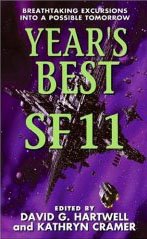Book Review: Hartwell & Cramer, Year's Best SF 11
 A child of the 70s, I grew up with science fiction. First on-screen in the US: the original Star Trek series, Saturday morning superhero cartoons, and most impressive of all, the first Star Wars movie at the age of five. Then we moved back to Sweden in '78 and I started reading. A lot. Our local library had – still has – a separate section for sf, most of it translated from English.
A child of the 70s, I grew up with science fiction. First on-screen in the US: the original Star Trek series, Saturday morning superhero cartoons, and most impressive of all, the first Star Wars movie at the age of five. Then we moved back to Sweden in '78 and I started reading. A lot. Our local library had – still has – a separate section for sf, most of it translated from English.My first sf favourites were Heinlein, Clarke, Aldiss and Simak. Never liked Asimov. I've later realised that the sf section existed largely thanks to one man, author editor translator publisher Sam J. Lundwall. Being also a founding father of the Stockholm Tolkien Society, he influenced my life in more ways than one.
It took many years before I became aware of sf short stories. But in 2002 I started reading David G. Hartwell & Kathryn Cramer's short fiction anthologies, Year's Best SF. Since then, I pre-order them every year on the net, and I've also read a number of earlier volumes. The most recent one, number 11, reached me last week. All the stories in it were published in 2005.
Science fiction, as you probably know, Dear Reader, has many sub-genres. One thing that sets them apart is how involved the author is with real science and engineering. Hard sf, such as Larry Niven, has a lot of it. Soft sf, such as Ursula K. LeGuin, deals more with people than machines and celestial bodies. If an sf author bothers to tell you in any detail how her space ships manage to travel faster than light, then she's hard. If he explores novel social arrangements, gender roles and how to co-exist with aliens, then he's soft.
The distinctive touch that make the Hartwell & Cramer anthologies so good is that they seek out hard sf stories with a soft perspective. In the new volume, for instance, there's Daryl Gregory's fascinating "Second Person, Present Tense", which riffs on an idea from actual neural psychology: what if the part of your brain that simulates your sense of personhood got whacked by a drug, forcing the brain to build a new ego to reside among your memories and knowledge? How would the new inhabitant relate to people who knew and loved the obliterated person whose brain and body she's inherited?
Or, as in Alastair Reynolds's "Beyond the Aquila Rift", what if your spaceship ran into a glitch in a space-time wormhole, catapulting you to an impossibly distant star system from which you would never be able to return? What would you tell your crew after waking them up out of suspended animation?
Or, if you seeded a planet with life and decided to leave a present for any intelligent beings that might one day evolve on it – what would you choose for a gift? Oliver Morton's "The Albian Message" offers a suggestion.
There are a lot of short, often humorous pieces in volume 11 as well, many culled from the fiction pages of Nature. I particularly liked the ones by David Langford, Bruce Sterling and Ted Chiang, and the baroque space-war prose poem "Dreadnought" by Justina Dobson.
This anthology is highly recommended. Good writing, memorable characterisation and mind-boggling new ideas. Dear Reader, when was the last time you came across a new idea?
Hartwell, D.G. & Cramer, K. (eds). Year's Best SF 11. EOS Science Fiction. ISBN 0-06-087341-7.
[More blog entries about books, review, sciencefiction, sf; böcker, sf, sciencefiction, noveller, recension.]



2 Comments:
Have you ever tried reading Gene Wolfe - a scifi/fantasy-writer? In my oppinion in a league of his own. Try Shadow and Claw. A master of the English langauge.
http://en.wikipedia.org/wiki/Gene_Wolfe
Yeah, I've read the first New Sun novel and a number of his shorts. But I'm sad to say, I really don't like him at all. But Hartwell & Cramer do!
Post a Comment
<< Home